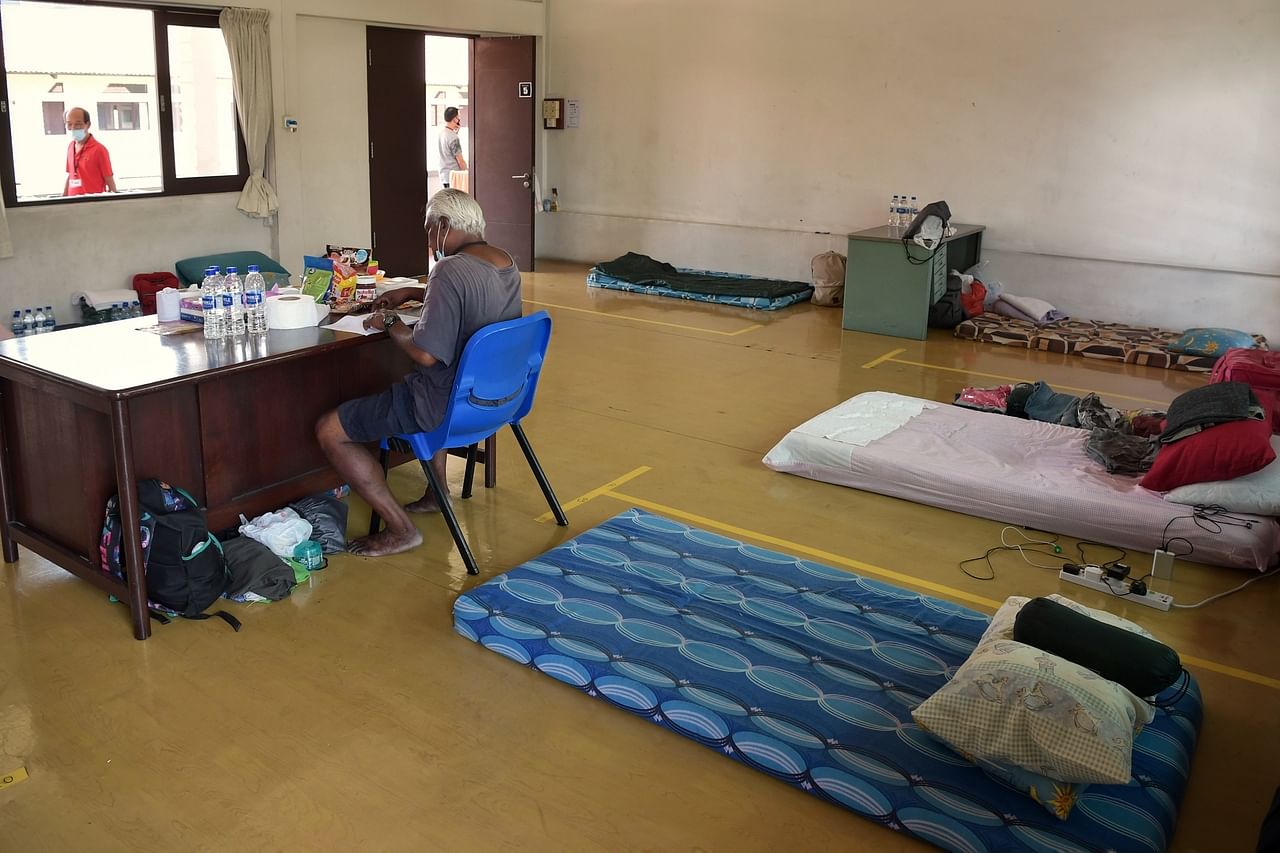Parliament: 300 homeless seek help from MSF Peers network during Covid-19 circuit breaker
Sign up now: Get ST's newsletters delivered to your inbox

Homeless people and rough sleepers will not face penalties if assisted by the Government.
ST PHOTO: KUA CHEE SIONG
SINGAPORE - Nearly 300 homeless people have sought help from an aid network during the circuit breaker period, Minister for Social and Family Development Desmond Lee said on Monday (May 4).
Called Partners Engaging and Empowering Rough Sleepers (Peers), the network had engaged 65 people last July when it was formed, of which less than half accepted help.
Peers is made up of 26 public agencies, social service agencies and community groups, and manages shelters and provides social intervention for the homeless.
Mr Lee was responding to questions from MPs about the support given to the homeless during the Covid-19 pandemic.
He told the House his ministry has worked closely with front-line agencies such as the police and National Parks Board during the circuit breaker to refer homeless people and rough sleepers to shelters and social services offices.
They will not face penalties if assisted by the government, he added.
"We have also distributed care packs with hygiene kits and surgical masks to temporary shelter residents, as well as homeless persons in the streets alongside encouraging them to accept shelter," he said.
To meet rising needs during the circuit breaker, 27 organisations have come on board, increasing the total number of organisations providing Safe Sound Sleeping Places to 35, said Mr Lee.
These shelters also allow guests to remain during the day and provide meals, and together accommodate some 700 people with 400 spaces still available.
The organisations include religious groups such as Kassim Mosque, the Anglican Diocese of Singapore, Ang Mo Kio Methodist Church, Tao One and Assyakirin Mosque. The Housing Board has also provided vacant rental flats.
Mr Louis Ng (Nee Soon GRC) asked for plans after the circuit breaker, when some of these organisations resume their normal functions.
Mr Lee replied that a number of Peers partners are prepared to continue providing space for the homeless even beyond the circuit breaker.
In addition to sleeping places, he added that his ministry will continue to make sure there are spaces at transitional shelters.
Such shelters, which currently house 70 families and 75 individuals, provide residents with a safe place while social workers help them address issues and work towards long-term, stable accommodation.
Nominated MP Anthea Ong asked for the number of homeless people who have been booked by the police under the Destitute Persons Act.
Mr Lee said people do not face penalties for being homeless, and only a small group of people who are unable to care for themselves and have no family support are subject to the Act.
"Even for that group, we persuade them to take shelter, we persuade them to admit themselves to a welfare home to get the support they need, and reserve the use of the legislation as a matter of last resort."
About 1,900 people are housed in welfare homes, where they get care, rehabilitation and are re-integrated into the community where possible. The number of such people who decline help is not tracked, he added.
While he did not have the number of homeless people fined for breaching circuit breaker rules, Mr Lee said the Ministry of the Environment and Water Resources with social service agencies exercise discretion in enforcing rules.
Replying to Mr Gan Thiam Poh (Ang Mo Kio GRC), Mr Lee said 90 per cent of people in transitional shelters and welfare homes are single, divorced, widowed or separated.
The minister also took questions from parliamentarians about people who remain homeless despite the Government's and Peers network's efforts.
Mr Murali Pillai (Bukit Batok) wanted to know about the current situation and what further steps would be taken to help them.
Mr Lee said those who cannot go home face a variety of circumstances, including family disputes, and work to engage them is ongoing.
"Safe distancing ambassadors have gone around with the help of social workers to identify people who are out there in the open, not because they refuse to comply (with circuit breaker rules), but because they have serious underlying issues back home," he said.
In the meantime, social workers with other partners try and resolve these issues while finding them temporary shelter.
Mr Lee said the crisis has reaffirmed the importance of close collaboration between government agencies and community partners, which allowed help to be extended swiftly to the homeless.
"Our aim is not only to keep homeless people and rough sleepers safe during the Covid-19 outbreak, but to help them resolve their underlying challenges and get back on their feet beyond this period," he said.


